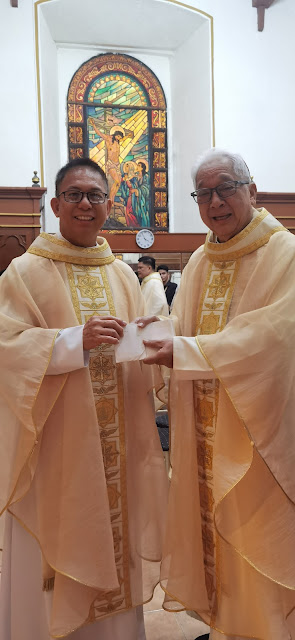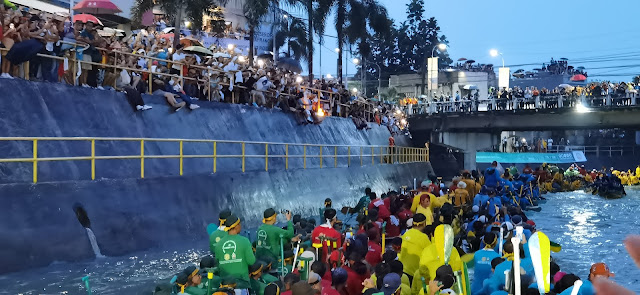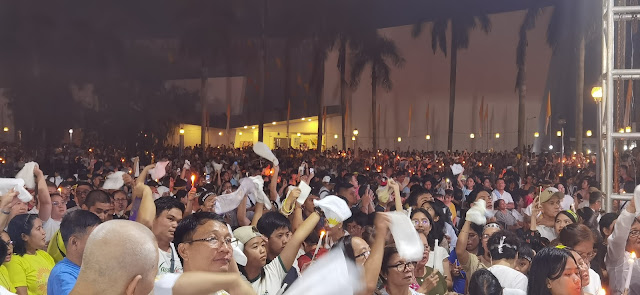One of
the most famous festivals in the Philippines that I had long hoped to attend is
the Peñafrancia Festival in Naga City, Camarines Sur. This celebration honors
Our Lady of Peñafrancia, lovingly called the Ina, a highly venerated image throughout the Bicol Region.
A key highlight of the festival, often mentioned, is the fluvial procession, in
which only men participate. Similar to Quiapo's Traslación in honor of
the Black Nazarene—where millions of mostly barefoot men join the
procession—Bicol offers its own grand tradition, this time in devotion to the
Blessed Virgin Mary.
This
year, I finally had the opportunity to attend the festival. I was asked to
represent the CBCP to present a plaque of appreciation to the Archbishop
Emeritus of Caceres, the Most Rev. Rolando Tria Tirona, OCD, marking his 30th
year as a bishop. Since the plaque was not handed to him during the plenary
assembly of bishops last July, it was decided to present it during the
Peñafrancia Festival in Caceres. The event was especially meaningful as it
coincided with the centennial celebration of the Canonical Coronation of Our
Lady of Peñafrancia. Additionally, the new Archbishop of Caceres, the Most Rev.
Rex Andrew Alarcon, was set to receive the pallium during one of the Masses.
Archbishop Alarcon deemed this event a fitting occasion to honor Archbishop Tirona.
The
Peñafrancia festivities span almost the entire month of September, beginning
with nine days of novena Masses in honor of the Divino Rostro (the Holy
Face of Jesus), venerated alongside the miraculous image of Our Lady of
Peñafrancia. This year, the novena for the Divino Rostro began on
September 4 and ended on September 13, which also marked the start of the
novena in honor of Our Lady of Peñafrancia. Masses were celebrated throughout
the day at both the Naga Metropolitan Cathedral and the Minor Basilica of Our
Lady of Peñafrancia. Each diocese in the Bicol Region made pilgrimages and
celebrated their own diocesan Masses. Every evening, Marian processions
illuminated the city streets.
On the
first day of Our Lady’s novena, the Traslación procession took place,
during which the image is brought from the Minor Basilica to the Cathedral for
the novena Masses. This tradition originated when the image was enshrined in a
smaller parish church and could not accommodate the influx of pilgrims. Although
a new and larger Minor Basilica was later built, the practice of transferring
the image to the Cathedral continues. Following the nine-day novena, the image
is returned to the Minor Basilica via the much-anticipated fluvial procession
along the Naga River.
On
September 20, the eighth day of the novena, a special Mass and reenactment of
the Canonical Coronation of Our Lady of Peñafrancia were held outside the
Cathedral at 4:00 PM. Thousands of devotees attended the Mass, presided over by
the Apostolic Nuncio, Archbishop Charles Brown. Also present was Archbishop
Adolfo Tito Yllana, Nuncio to Israel and Apostolic Delegate to Jerusalem and
Palestine, who hails from Bicol. The bishops of the Bicol region were also in
attendance as well some bishops from other dioceses.
The
following morning, September 21, at 7:30 AM, the Eucharistic Celebration for
the Imposition of the Pallium upon Archbishop Rex Andrew Alarcon took place.
During this Mass, just before the final blessing, the plaque of appreciation
was presented to Archbishop Tirona. I read the citation and handed the plaque
to the Apostolic Nuncio and Archbishop Alarcon, who then presented it to
Archbishop Tirona.
That
afternoon, I had the privilege of joining the fluvial procession, an
awe-inspiring event. I boarded the pagoda, a large barge carrying the
images of the Divino Rostro and Our Lady of Peñafrancia. The Coast Guard
enforced strict regulations, allowing only those pre-registered to board the pagoda.
Hundreds of colorful boats, arranged in four rows, pulled the barge, with
boatmen wearing uniforms representing various communities and organizations.
Crowds of people lined both sides of the riverbank, watching from rooftops and
bridges. It was a breathtaking sight. The procession concluded near the Minor
Basilica, where the image was enshrined once again.
The
following day, the center of activity shifted to the Basilica, with Masses
celebrated continuously to accommodate the overwhelming number of pilgrims. At
the Cathedral, simultaneous Masses were even held both inside and outside to
serve the faithful.
The
Peñafrancia Festival is truly a testament to the enduring devotion of the
Filipino people to Our Lady. Being part of this vibrant and faith-filled
celebration was an unforgettable experience.



















































